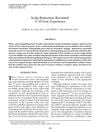Revision Surgical Hair Restoration: Repair of Undesirable Results
July 1999
in “
Plastic and Reconstructive Surgery
”

TLDR Unsatisfactory hair restoration results can be significantly improved with strategic hair redistribution and new donor hair placement, despite previous surgery challenges.
In 1999, Dr. Jeffrey S. Epstein conducted a study on over 40 patients who were dissatisfied with their previous surgical hair restoration results. The study identified three main causes for these unfavorable results: technical errors, poor planning, and complications. Epstein developed several reparative surgical techniques, including further hair transplantation, donor scar revisions, punch reduction, graft retransplantation, graft removal with primary closure, scalp flap surgery, and scalp reduction. Despite the increased risk of complications due to prior scalp alterations, no significant complications occurred. Minor complications were correctable and overall patient satisfaction was high. The study concluded that strategic placement of available donor hairs and redistribution of already transplanted hairs can significantly improve appearance, despite the challenges of limited donor hair supply from previous surgeries.





